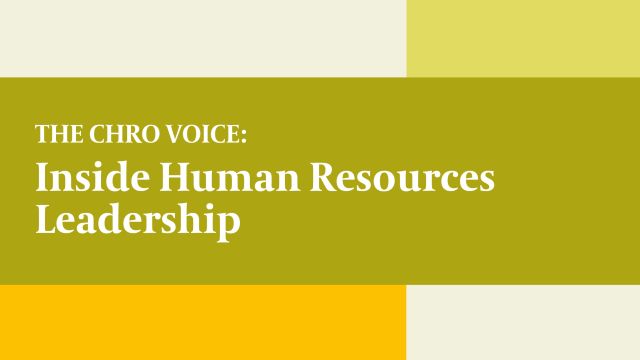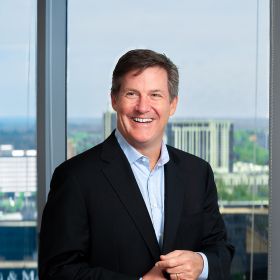Whether you're talking to someone from the Silent Generation, Gen Z, or soon Gen Alpha, one thing is consistent: people want to be heard. The way you show that appreciation may differ by generation, but the underlying need is the same. That’s where empathetic leadership comes in.
 Tim HouriganExecutive Vice President – Human Resources, The Home Depot
Tim HouriganExecutive Vice President – Human Resources, The Home Depot
After nearly 23 years at The Home Depot, Tim Hourigan will retire as Executive Vice President – Human Resources on June 14, 2025. Under his leadership, the world’s largest home improvement retailer with nearly 475,000 orange-blooded associates and more than 2,300 stores across the U.S., Canada, and Mexico has operated on a simple but powerful principle: lead with empathy. At the heart of that culture is the company’s founding “Inverted Pyramid” model, where customers and frontline associates come first, and the CEO comes last. It's a structure that has enabled The Home Depot to align business strategy with human values—and thrive.
After nearly 23 years at The Home Depot, Tim Hourigan will retire as Executive Vice President – Human Resources on June 14, 2025. Under his leadership, the world’s largest home improvement retailer with nearly 475,000 orange-blooded associates and more than 2,300 stores across the U.S., Canada, and Mexico has operated on a simple but powerful principle: lead with empathy. At the heart of that culture is the company’s founding “Inverted Pyramid” model, where customers and frontline associates come first, and the CEO comes last. It's a structure that has enabled The Home Depot to align business strategy with human values—and thrive.
We sat down with Hourigan as he prepares to step into a new chapter—one that includes more time with his first granddaughter—for a candid conversation on what it takes to lead with empathy, partner effectively with the CEO, influence leadership at the highest level, balance business with people, and build a legacy HR leadership through succession planning.
The CHRO role is often described as the second loneliest in the C-suite. Does that resonate with you?
The CHRO role is often described as the second loneliest in the C-suite. Does that resonate with you?
Absolutely. It's often said that the CEO holds the loneliest role in the C-suite. But the truth is, the CEO has the CHRO. As CHROs, we play a critical role: we’re the sounding board, the confidant, the one reinforcing key messages. That relationship with the CEO is essential to being effective.
But then, who do we talk to? Often, we must hold it all in. The CEO might say, 'Here’s what I think about this person,' or 'We really dropped the ball on that initiative—how do we move forward?' You have a deep, consultative conversation. And then what? Where does that go?
There’s no one to turn to with those sensitive insights. Who’s your trusted confidant? For most of those conversations, there simply isn’t one. Sure, when it comes to tactical matters or broader organizational strategies, you can bring others in. But about half the time, it’s just you and the CEO—having open, candid, and confidential discussions. And you can’t break that trust. So yes, in many ways, it is lonely. Not because you’re isolated, but because there’s no one to share the weight of those deeply sensitive topics with.
How do you navigate the multifaceted role of CHRO—balancing HR leadership, business strategy, and influencing the leadership team?
How do you navigate the multifaceted role of CHRO—balancing HR leadership, business strategy, and influencing the leadership team?
There are four key criteria that define great HR professionals—whether you're just starting out, mid-career, or in a senior role:
First and foremost, you have to be a student of the business. You need to understand the business deeply—its nuances, drivers, and especially the pain points of your business partners, no matter where you sit in the hierarchy. Whether you're supporting a district manager or the CEO, you need to see things through a business lens. Throughout my career, I’ve spent a lot of time learning the business. I remember walking stores with [former CEO] Craig Menear when he was EVP of merchandising, before becoming CEO. We talked about assortment, planogram strategy, pricing, and the target customer. That understanding was critical for me.
Second, you have to be an HR expert. You don’t need to know every single detail, but you must have a strong grasp of HR fundamentals. You can rely on your team or external resources for depth, but you need to know where to go and how to translate business issues into effective HR solutions—and then translate those solutions back into business outcomes.
Third, you must be an advocate for the associate. In big discussions, you’re not the only one with that perspective, but you are the one who must consistently bring the associate’s voice into the room—especially when they’re not there. That requires understanding the business, understanding HR, and understanding what associates need.
And fourth—and maybe most important—you must be courageous. It’s not enough to recognize an issue or understand its impact. You have to speak up. You have to raise that point of view in a way that drives positive outcomes.
When I think about balancing all of this, those are the four pillars I come back to. And with peers, we won’t always agree. We’ll argue. But if you’re coming from a place of deep business understanding, grounded HR expertise, genuine care for associates, and the courage to speak up—you can influence business strategy, shape leadership decisions, and drive meaningful outcomes for the entire organization.
You recently went through a CEO transition, and now you're preparing for your own successor. How deeply involved are you in these critical leadership transitions?
You recently went through a CEO transition, and now you're preparing for your own successor. How deeply involved are you in these critical leadership transitions?
This is one of the core responsibilities of the CHRO—especially when it comes to C-suite roles. Yes, we focus on talent pipelines across the organization—whether it's store managers, district managers, or other key roles. You have to ensure those pipelines are strong, that the right skill sets and competencies are clearly defined, and that they’re differentiated in terms of what drives success. Then, you need to build development plans and experiences that help grow those capabilities. And that work extends all the way to the top.
In this role, I support the board and their responsibility for succession planning—primarily for the CEO, but really for every C-suite position. This is where the relationship between the CHRO and the CEO becomes critical. You need to be able to share candid observations, backed by data, and have open, honest conversations about what’s next.
Whether it’s a CEO, CFO, or any other executive role, you have to be in those discussions. Since I’ve been here, we’ve replaced every member of the C-suite, except our Chief Legal Officer. Some of those transitions were smooth and positive; others were more difficult. You need to be willing to have the tough conversations and make the hard calls—because the stakes are too high not to. You’d like to think you’ll get it right 100% of the time, but no one does. And when there’s a misstep, you have to correct it quickly. The impact is just too significant to let it linger.
The skill set required to succeed in HR is constantly evolving. What are the most critical skills for future HR leaders?
The skill set required to succeed in HR is constantly evolving. What are the most critical skills for future HR leaders?
There are three key skills—and a couple of them were highlighted during Covid. First is the ability to deal with ambiguity and make decisions with incomplete data. It’s not about guessing—you use the best information available, even if it’s limited, and make the most informed decision you can. Then, you stand behind that decision until new data emerges. That’s a critical skill in HR, where the topics are often complex and evolving.
Second is resilience. You’ll make decisions based on the best data you have, and two days later, you might find out it was the wrong call. You can’t beat yourself up over it. I’ve told my team this over and over. During the early days of Covid, we donated six million N95 masks to hospitals based on CDC guidance that masks weren’t needed. The very next day, that guidance changed. As an essential retailer, we quickly adapted—air-freighting masks in to protect our associates. That’s ambiguity in action—we acted upon the best information available at the time.
Third—and this is the umbrella skill—is continuous learning. You must be relentlessly curious. That applies across the board, but especially now with AI. If you’re in HR and not actively learning about AI—its implications, its capabilities—you’re going to fall behind. And that curve is moving faster than anything I’ve seen in my career. If you’re not learning aggressively, you’ll be in a hole before you know it.
What advice do you have for the next generation of HR leaders in terms of their own development? How should they think about their career paths?
What advice do you have for the next generation of HR leaders in terms of their own development? How should they think about their career paths?
My very first boss in HR gave me advice that stuck with me: learn the business. Going back to the four attributes I mentioned earlier, this is foundational. People don’t really care how much you know about HR if you don’t understand their business. So, push yourself to learn as much as you can—no matter what industry you’re in.
Second, and this is more of a mindset than a skill: don’t focus so much on how fast you get there—focus on how long you stay once you do. Early in their careers, many people are eager to move up quickly. That ambition is great, but it’s important to keep a long-term view. I took several lateral moves throughout my career. At the time, I didn’t always understand what I was gaining. But when Covid hit, I had to draw on a wide range of skills I’d built over the years—skills I didn’t even realize were so important until I needed them.
In this role, I’ve talked to many people who felt disappointed about not getting a promotion or not moving as fast as they hoped. I always encourage them to think differently: it’s not about speed—it’s about staying power. Many of the people who felt ready two or three years earlier ended up excelling when the opportunity finally came. They had refocused, developed further, and when the time was right, they were exceptional in their new roles. To me, that’s a real differentiator in long-term performance.
How are you managing the expectations and contributions of different generations in your workforce, and what impact is that having on workplace culture?
How are you managing the expectations and contributions of different generations in your workforce, and what impact is that having on workplace culture?
We talk about this a lot. One of our main focuses is helping leaders develop empathetic leadership skills. While this phrase can mean different things to different people, especially with six generations now in the workforce, it starts with understanding where people are coming from.
The command-and-control leadership style from 30 years ago is outdated. Whether you are talking with someone from the Silent Generation, Gen Z, or soon Gen Alpha, the constant is this: people want to be heard and appreciated for their contributions. Though the expression of appreciation may differ among generations, the underlying need is the same.
That’s where empathetic leadership comes in. At Home Depot, we use an inverted pyramid leadership model. At the top are our associates, with the CEO at the very bottom. This model reminds us that leadership bears the weight of the organization. Taking on a senior role means more responsibility to support others.
Understanding each generation's needs is crucial, recognizing that not all Boomers or Gen Z members are the same. Everyone is different but wants to feel respected and valued. The core need is universal, expressed differently. Leaders must listen, show genuine respect, and adapt their style accordingly. Our founders left us a strong foundation—the Value Wheel, composed of eight core values. These values guide our decisions. While their application may differ across generations, the values remain constant. As leaders, our job is to apply them with empathy and understanding.
As you approach retirement, what are you most excited about from an HR perspective and a personal perspective as you look ahead to the next chapter?
As you approach retirement, what are you most excited about from an HR perspective and a personal perspective as you look ahead to the next chapter?
From an HR standpoint, I’m most excited about what feels like a new frontier. The availability and accessibility of data today is unlike anything we’ve seen before. When you think about how businesses have evolved over time, this moment feels like a major inflection point. The ability to gather, analyze, and act on massive amounts of data—quickly and cost-effectively—is going to fundamentally reshape how HR supports the business.
I honestly can’t imagine what it will look like five years from now—but I do know it will be dramatically different. It’s going to change how we think about our roles, how we deliver value, and how we contribute to business outcomes. It’s a little scary, but it’s also incredibly exciting. If I weren’t retiring, I’d be energized to be part of that transformation. I truly believe the next five years will bring as much change as the last fifty.
On a personal level, what I’m most excited about is twofold. First, the classic answer: spending more time with friends and family. But I really mean it. My wife and I were just talking last night about our son and daughter-in-law, who recently had their first child—our first grandchild. That little girl is going to be so loved (and maybe a little spoiled). She might not walk until she’s three because we’ll be carrying her everywhere!
Second, after 47 years in a professional role, I’m looking forward to finally being able to say yes to things I’ve had to say no to for so long because of work commitments. That freedom—to be present, to choose how I spend my time—is something I’m genuinely looking forward to.







